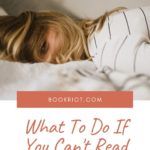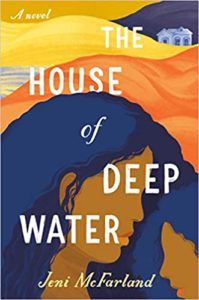Reading is normally a very comforting activity for me. But we are all experiencing very abnormal circumstances right now. I find that I can’t read without intrusive thoughts taking up ample headspace (one example: “Why are these characters leaving the house!?”). Stress related to COVID-19 has spoiled my ability to tune out of reality and instead dial into a peaceful mindset when reading. I have some work to keep me occupied most days, but in the afternoon and evenings (when I’d typically want to shut off my tired brain and read a good book), I find myself scouring the news for COVID-19 updates. Technically I was “reading” Jeni MacFarland’s forthcoming debut, The House of Deep Water for the entire month of March. I mean this loosely, because I managed to read only a handful of pages each time before putting it back down, frustrated by my noisy mind. If your usual go-to comfort activity is reading but you have found yourself struggling to focus on any book you pick up, know that you’re not alone. Myself and some other Book Riot contributors feel disconnected from books, too, and are mourning the time away from literature. It started for me a few weeks ago, as the spread of COVID-19 first resulted in stay-at-home mandates for certain regions or countries. Soon after, I observed a resounding message on social media: seemingly everyone planned to read to cope with the correlating anxiety of this pandemic. I’ve scrolled through content about people challenging themselves to read the books they have always meant to but never managed to finish, and even choosing 500+ page books to stay occupied. (Five hundred pages!!! I can hardly get through five pages without putting the book down to stare out the window for a half hour of existential dread.) Even the Book Riot Slack channel is flooded with discussion about which books people have waiting for them in their piles. First and foremost, I encourage you NOT to compare yourself to others who are reading record-setting amounts while social distancing (your sanity will thank you). Instead, remember that everyone responds to stress differently. To help me feel less alone, I reached out to fellow Book Riot writers to see if any of them can’t read either and what, if anything, they are doing as a replacement to achieve some semblance of relaxation. Because we all miss the element of enjoying a good story usually achieved by reading, we mostly have embraced storytelling in different formats than books. Here is what I encourage you to try as an alternative if you can’t read right now.
Embrace Stories in Different Formats
Audiobooks
Whether you’re a regular listener or new to the audiobook format, it is a good option for absorbing all the features of a story in a more passive way than reading a traditional book. Jamie Canaves is, in her words, “inhaling” audiobooks right now while she finds it challenging to read peacefully. In particular, audiobooks allow Jamie to “get fully sucked into the story and world.” I have to admit, I have not hopped onto the audiobook train. As a person who performs voiceovers, I’m very picky about the quality of narration and usually focus on how the artist sounds rather than what they are saying. It’s an occupational hazard of the job! But, I might try some audiobooks again (starting from the audiobook archives for inspiration) now that how I read stories has fundamentally changed.
Podcasts
Every podcast ultimately shares a story with a beginning, middle, and end, so why not lean on them more for your story fix? There is such a variety of podcast content that it can be overwhelming to start searching from scratch if you’ve never tried them before. Considering our current social climate, you can seek out some happiness-boosting podcasts or engaging storytelling podcasts as a starting point. Of course, Book Riot produces a ton of podcasts, too, and since you already like books there’s bound to be a match.
Turn Off Your Buzzing Brain While Being Active
I felt a real connection to Courtney Rodgers when she shared with me that she “can’t handle any new information or stories right now” as a side effect of information exhaustion. Instead, Courtney is staying busy: cleaning, exercising, doing yard work, and anything else she can dream up that has a productive element to it. I like this concept because, usually, when I’m focused on a task that involves moving my body it is much easier for me to focus entirely on that activity (scrubbing the bathroom, cleaning the dishes) and my mind, miraculously, doesn’t wander. My personal solution to my increasingly urgent need to find a release for my stress in a combination of these suggestions. I’m very fond of taking long walks and occasionally a lightweight jog. I feel so fortunate that the weather in my region of the Pacific Northwest has recently changed for the better, with some midday sunshine inspiring me to come out of socially distanced hibernation and breath fresh air. My mind has felt at ease while I pace around the block and listen to the new season of one of my favorite podcasts, Ear Hustle. At last, I feel comforted in the way I normally can from reading a book on my couch. Reading has always been my solace, so the absence of connection to it leaves me feeling insecure when uncertainty and fear are already weighing on my mind. It really sucks right now, but I can’t wait until I feel embraced by a good story again. If you can’t read either while sheltered indoors, I really hope some of these storytelling-adjacent suggestions can set you on the right path to discovering a stress-free activity.

